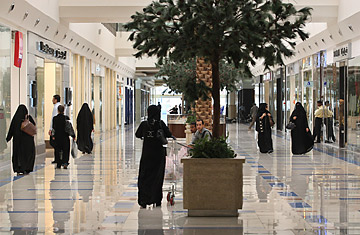
Saudi women walk at a shopping mall in the Saudi capital of Riyadh.
It's 2 a.m., do you know where your kids are? If you're in Riyadh during Ramadan, chances are they're staying out of trouble — at the mall.
In Saudi Arabia's desert capital, nightlife takes a whole different meaning during the Muslim holy month of fasting; midnight traffic jams are commonplace as Saudis head for late, late prayers at brightly lit mosques, then visit families and friends for a hearty meal. Many round off the night with some postprandial retail therapy at giant shopping complexes or old souks, some of which stay open until 3 a.m.
Like observant Muslims everywhere, Saudis fast (not even a drop of water passes their lips) from dawn to dusk during Ramadan; the fast is broken with a communal meal known as iftar, at around 5.30 p.m., and this is followed by special prayers. In most countries, worshippers then go home to sleep, so they can wake early for a heavy predawn meal that will carry them through the 9-to-5 grind that continues despite the fast.
But for many Saudis who work in retail, iftar is breakfast — both literally and figuratively. After the special prayers, they go to work, and business usually begins to hot up after 10 p.m. Government offices are closed, but it's not unusual for those working in the private sector to take a meeting close to midnight.
The timing of Ramadan is determined by the lunar calendar, and it tends to advance by a month of the Gregorian calendar — last year, it was in October. This year, it coincides with the school break, leaving parents to deal not only with hunger, but also with bored children. The heat (temperatures remain close to 100 degrees even at night) means outdoor activities are limited, and in a country where cinemas are taboo, entertainment options are few. TV stations put on special Ramadan programming, especially comedies and costume dramas, but they're hardly enough to hold the attention of a 15-year-old.
The Saudi government's solution: "Ramadan Clubs" for young people. The Ministry of Education has opened 200 of these across the country, to give the kids something useful to do after the special prayers. The clubs offer a range of spiritual and educational activities — worthy endeavors all, but not quite the stuff that fires youthful imaginations. And so, late into the night, the malls are full of teenagers.
Despite the parental and governmental concern, though, the kids are not likely to get in trouble, because malls in Riyadh offer no sinful temptations. There's no alcohol, and hardly any drugs. There's little or no mingling of the sexes: boys and girls, per Saudi custom, keep well away from each other. And there are watchful adults everywhere: chaperones, security guards, and occasionally, the dreaded muttaween religious police, who are authorized to dole out summary beatings to anybody caught breaking the strict moral codes. (The muttaween have been less conspicuous during this Ramadan compared with previous years, but the fear of getting caught still lingers.)
In any event, the kids won't have the malls to themselves for very much longer. The last 10 days of Ramadan, starting Sept 20, bring on a shopping frenzy as Saudis buy new clothes and gifts in anticipation of the Eid festival that ends the fast. Think of it as 10 Black Fridays in a row. And once they're filled with parents, Riyadh's malls are likely to lose their cachet with the kids.
